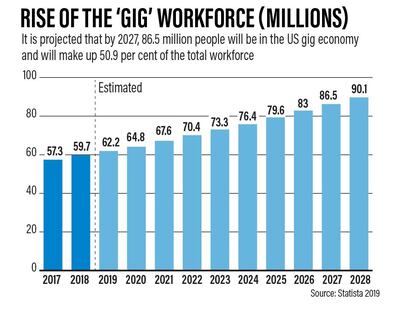“I work at Google now!” an enthusiastic friend said over the phone, adding “but on a contractual basis for six months”.
My friend is one of thousands of contractors who work for Google. As of March 2019, Google worked with around 121,000 contractors and temporary employees around the globe, outnumbering their 102,000 full-time employees, according to the New York Times.
Today’s graduates are joining a workforce where the gig economy, which includes freelancers, consultants, and on-demand employees, is on the rise.
Research by Oracle found 48 per cent of human resources directors in the UAE believe the gig option will help them develop broader specialised skills. About 34 per cent plan to hire more gig or temporary employees by 2020. Though the last figure may be a bit low, I believe it would increase with time, as is the case in Western economies.
A study commissioned by Upwork and the Freelancers Union revealed around 57 million US workers are freelancers. The freelance industry also contributed nearly $1 trillion (Dh3.67), more than industries such as construction, and almost the same as the information sector. Freelancers also make $28 per hour, earning more per hour than 70 per cent of workers in the US.
With these rapid and vast changes happening to the workforce around the world, I believe we need to incorporate more studies and courses about the gig economy in our region’s university curriculums.
On a personal level, many fresh graduate students who wish to venture into the freelance or small business world, always ask for advice on how to do that.
They are well equipped to join full time employment jobs, have interned at traditional nine to five jobs, but don’t have the basic knowledge of navigating the freelance world.
Skills associated with how one can build a small business and operate as a freelancer can be taught.
The UAE is ahead in this field, and appreciates the importance of equipping graduates with basic entrepreneurship skills. The Ministry of Education introduced innovation and entrepreneurship courses to federal and private universities in the country. The Fundamentals of Innovation and Entrepreneurship is a compulsory course for students at Abu Dhabi University.
Universities in the region should not stop at providing entrepreneurship courses but include compulsory internship opportunities for students to be freelancers, or remote workers. That can happen in collaboration with online-based companies, or those with business models that are built on the gig model.
Even if students do not wish to pursue a gig job option upon graduation, they need to have some basic background about the required skill-set of a sector that is contributing largely to economies around the world.
More universities should integrate talks by successful freelancers and contract workers in their programmes that illustrate successful examples of those who operate in non-conventional work environments. Students need to be able to interact with freelancers, and learn about their experience first-hand.
Last year I had two university students work in our offices as remote interns for two months. One worked from Oman and the other from Saudi Arabia. With the latest communication programs, and work-sharing applications, they were able to deliver and excel at their tasks. The experience encouraged them to seriously consider freelancing as a career choice. They appreciated that they were able to do the work from the comfort of their locations, staying close to family members who needed them, and learning valuable skills to navigate this new economy landscape.
The gig economy is changing the way businesses function and the hiring trends of companies. Students need to learn how to be freelancers, and how to work in small businesses and from remote locations. By providing students with the option to work as part of the gig economy, universities will better equip them for a role they may choose at some point in their career.
Manar Al Hinai is an award-winning Emirati journalist and entrepreneur, who manages her marketing and communications company in Abu Dhabi


